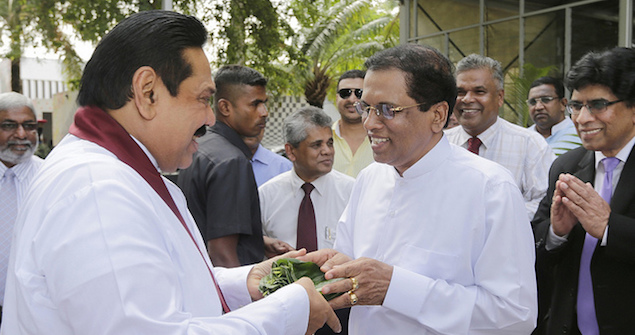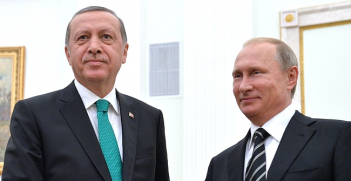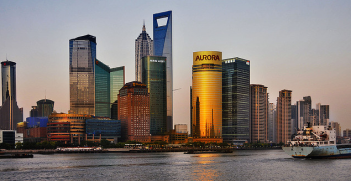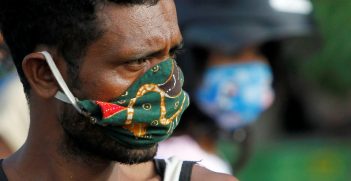Sri Lanka Chooses Changes

The recent election of President Maithripala Sirisena heralds a golden opportunity for Sri Lanka to heal old wounds and to open up its economy — and for the West, India and even East Asian countries to re-engage.
In November 2014 the former president, Mahinda Rajapaksa, called an early election in the hope it would be a cakewalk. Instead he was defeated by an effective opposition challenge that tapped into a groundswell of popular resentment with one-family rule. Only two months ago, the Rajapaksas seemed invincible. On 8 January, their edifice collapsed.
The new government faces daunting challenges to restore parliamentary democracy, bring about ethnic reconciliation, reform the economy and re-orient foreign policy. It would be in the interests of Western powers, India and East Asian countries to engage Sri Lanka.
Sri Lanka is in a better position now than it was at the end of the civil war, almost six years ago. But several things went wrong under Rajapaksa’s rule.
Politics became a one-family business. Power was centralised in the hands of the president, his brothers and son. An outer circle of relatives and hangers-on enjoyed the trappings of power and indulged in unprecedented levels of corruption. The Rajapaksas came close to destroying the legislature, judiciary, police and military. They co-opted business and repressed the media and NGOs.
Ethnic relations also worsened. The government stoked triumphalist Sinhala-Buddhist chauvinism to shore up its vote base among the ethno-religious majority. There was no attempt at genuine reconciliation with Tamils in the war-scarred north and east. And senior members of the government abetted attacks against mosques and Muslim-owned shops as well as Christian churches.
On the economic front, structural problems have become more acute. This seems surprising, given that Sri Lanka has one of the highest growth rates in Asia, much improved infrastructure and booming tourism.
But post-war growth is a classic debt-driven bubble. Increased foreign borrowing has financed infrastructure projects and handouts. This leaves Sri Lanka much more exposed to higher interest rates in often volatile international capital markets. On the supply side, economic liberalisation has been reversed. The government intervenes much more to favour an expanded, loss-making public sector. Trade protectionism has increased. Foreign investment is stagnant, with the exception of real estate and hotel projects. Export competitiveness and overall levels of productivity have declined.
Meanwhile, foreign policy swung away from the West and India and towards China. Sri Lanka is now dangerously reliant on China, whose loans pay for much of the new infrastructure. But this contradicts Sri Lanka’s global economic interests. The US and the EU account for two-thirds of Sri Lanka’s exports. India is just over 20 kilometres away and a far bigger trading partner than China, with huge potential for closer economic links.
The opposition’s shock victory presents a golden opportunity for a fresh start. But this is far from assured. The new government is extremely diverse and could fall apart. There could be recriminations against minorities. Public institutions are still packed with Rajapaksa allies. And Sri Lanka has squandered rare opportunities for regeneration before.
What should be on the reform agenda?
The new government’s 100-day program on constitutional and political reform is sensible. The all-powerful executive presidency will be abolished and a Westminster-style parliamentary system restored. A new constitutional amendment will re-establish the independence of institutions such as the police, judiciary and public service. New parliamentary elections will be followed by a cross-party government for at least two years.
But the same program is silent on ethnic relations — except to reject international jurisdiction to investigate war crimes. But ethnic reconciliation will have to be on the agenda. It must include the long-delayed devolution of powers to provincial councils, including those in the Tamil north and Tamil-Muslim east. Encouragingly, the new government has signalled it will move in this direction.
The 100-day program’s economic measures are nakedly populist. Public-sector salaries, pensions and welfare benefits will be raised and taxes reduced. There will be guaranteed purchase prices for some agricultural products. Farmers will have debt relief. There will be a new government agency for drivers of three-wheelers. All this continues the interventionism of the Rajapaksas and puts further stress on public finances.
It is vital for the handful of economic liberals in the governing coalition to push for strong market reforms to repair public finances, deregulate the economy, open up to trade and foreign investment and reform the public sector. Realistically, these reforms will have to await the outcome of the parliamentary election. Their best hope is a government led by Ranil Wickremesinghe — the new prime minister — and a core, competent economic team from his United National Party.
Finally, foreign policy should be reoriented, emphasising better relations with the West and India. Thankfully, this seems to be underway already. Better relations with East Asian countries — not only China — should follow.
How should other countries engage Sri Lanka? The answer is not to give overriding priority to a UN war crimes investigation into the final phase of the conflict with the Tamil Tigers. This is very sensitive in the Sinhala heartland and would weaken the brittle new governing coalition. Of course this issue should not be brushed under the carpet. But there must be a sensitive, long-term approach for dealing with the issue: an approach that encourages a credible domestic process of investigation and reconciliation. Nothing should be done to undermine Sri Lanka’s unexpected fresh start and its chances of success.
Sri Lanka’s immediate priorities are for political, economic and institutional reform. The West, India and East Asian countries can encourage it by putting economics at the centre of engagement. Restructuring foreign debt might be necessary. But most important are open markets for trade and investment. India and Sri Lanka should deepen their free trade agreement. The US, EU and others should explore new free trade negotiations with Sri Lanka. These measures would be the smart way to engage Sri Lanka.
Razeen Sally is Associate Professor at the Lee Kuan Yew School of Public Policy, National University of Singapore. This article was originally published on East Asia Forum on 28 January 2015. It is republished with permission.





